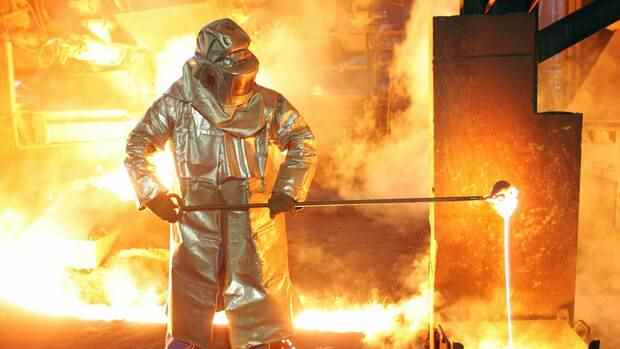The classic blast furnace route in steel production no longer has a future; companies have to invest in new processes.
(Photo: imago images / photothek)
Berlin The industry is facing major challenges on the way to climate neutrality: New plants have to be built, at the same time the costs of the ongoing operation of these new plants are significantly higher than the previous costs.
The Institut der Deutschen Wirtschaft (IW) is convinced that investment aid and support with running costs are the most efficient of the various aid instruments that are being discussed. This emerges from an as yet unpublished IW study that is available to the Handelsblatt.
It is undisputed that the industries most affected, such as steel and chemicals, cannot cope with the transformation to climate neutrality on their own. The reason for this is that in other regions of the world climate protection does not play as big a role as in Europe. The study states: “With emissions trading, Europe priced a large proportion of global emissions relatively high. On the other hand, most emissions worldwide are significantly cheaper or even free of charge. “
In an international comparison, the price differences result in considerable cost differences. “In order to enable industrial production at climate-friendly conditions, a compensation mechanism must be found,” says the study. Otherwise there is a threat of “an increasing wave of disinvestment with long-term consequences for the industrial prosperity base”.
Top jobs of the day
Find the best jobs now and
be notified by email.
The topic is also dealt with in the coalition talks between the SPD, Greens and FDP. The potential coalition partners must agree on how they want to help the industries concerned. This involves billions of dollars every year.
Not all tools helpful
The IW comes to the conclusion that some of the instruments discussed are not very helpful. For example, a CO2 border adjustment, which the EU Commission wants to introduce, for example, is “not expedient enough and potentially dangerous in terms of trade policy”.
In addition, no positive effect is to be expected on the export side, so this approach should be avoided on its own. The USA and especially China have already signaled that they reject the CO2 border adjustment planned by the Europeans.
The IW also considers the current practice of allocating free emission certificates to industrial companies that are in international competition unsuitable in the long term. The free allocation is “still necessary” for energy-intensive companies. However, it will “hardly be possible in the long term if the emission ceilings continue to fall,” says the IW paper.
In fact, the EU Commission has announced that it will significantly tighten emissions trading. The number of certificates available will therefore increase drastically in the coming years.
The IW positively rates efforts to establish a “climate club” in which states come together that commit to joint efforts in climate protection. “Such a climate club should at least include the EU, China and the USA,” says the IW paper. The IW recommends focusing on individual groups of goods.
Climate protection-related investments necessary
However, since the Climate Club has so far been little more than a vague idea, the industries affected need concrete commitments to help quickly. Only in this way can they succeed in compensating for cost disadvantages in international competition.
The IW writes that the promotion of climate protection-related investments is necessary in order to enable the conversion of production at domestic locations. Likewise, a “long-term funding of ongoing additional costs” is required.
For the financing, the IW relies on the income from the European emissions trading system and puts this at a certificate price of 50 euros at five billion euros annually. But according to the IW, that should not be enough.
Funds going beyond this would therefore have to be financed from the federal budget. The inexpensive provision of climate-neutral hydrogen and electricity from renewable sources could also play an important role.
More: Why climate protection agreements can be the last chance for industry.


